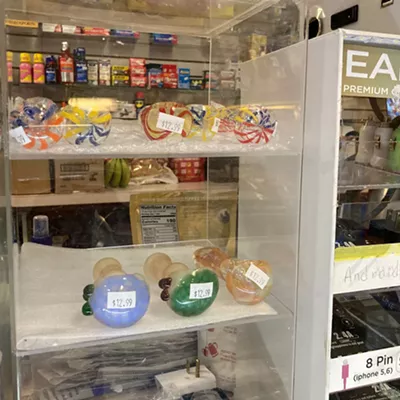This year saw some big transitions on our news team. In April, I moved up to become news editor. Though I'm still writing (admittedly less often), it left a hole on our small, three-person news team. Nate Sanford and Colton Rasanen stepped up to report even more news, covering the biggest happenings in the city and our local school districts, as well as the community at large. By July, we brought on Victor Corral Martinez, who'd previously reported in North Idaho and California, to fill out our team. Then in September, Sanford returned to Seattle to take the next step in his career, but first he wrote a marathon of election coverage for us. Luckily, we were able to tap the journalistic talent we already had in Eliza Billingham, pulling her from our food section to take over the city beat.
In the midst of all our internal changes, this team reported powerful stories on the people who live here, important changes in our region, and the challenges facing our city, county, state and tribal leaders in both Washington and Idaho. Throughout it all, we kept in mind our goal to highlight the news through the experiences of those who are most impacted. As the year comes to a close, we rounded up some of the biggest news of the year, and stories we're proud of.
— SAMANTHA WOHLFEIL, News Editor
WHO'S HERE? (Jan. 25)
The end of December and beginning of January are notoriously slow times for journalists. Every source seems to be taking time off and regular meetings are often cancelled due to the holidays.It's a wonderful time to dig into data. That's what we did at the end of 2023 and into early 2024 with voter data from the Idaho Secretary of State. Thanks to an optional question on voter registration forms, we were able to decipher where voters in Idaho had moved from. This data also allowed us to dispel the common misconception that Californians are moving to Idaho to liberalize the Gem State. In fact, about 80% of the nearly 40,000 Californians who moved to Idaho had registered as Republicans.
While the same information wasn't available in Washington, we were able to find similar information in driver's license data. Every time someone moves to Washington, they have 30 days to obtain a new state license. While we couldn't parse the political affiliation of these new Washingtonians, we could determine which states they came from. Both data sets confirmed: More people moved to Washington and Idaho from California than from any other state. That's not necessarily surprising when you consider that, aside from its proximity, California has a population comparable to some countries, such as Canada and Paraguay.
Why people moved to each state still remains unclear. For some, it was likely a lower cost of living. For others, it was probably tied to the low population density Idaho is known for. The Idaho Secretary of State data hasn't been updated since November 2023, but in Washington the updates keep coming by the month, showcasing the same trends we analyzed a year ago. (CR)
SUPERFUND STATUS (Feb. 22)
The Columbia River flows for roughly 150 miles from the Canadian border to Grand Coulee Dam. Just about 10 river miles north of the border, Teck, a Canadian mining company, owns a lead-zinc smelter, which historically dumped black sand-like slag in the river.In 2006, a settlement kicked off a detailed pollution study of the Upper Columbia region by the Environmental Protection Agency and Teck. Though the company has been helping determine the extent of the contamination, and has paid to clean some yards contaminated with high levels of lead, Teck is not necessarily liable for the overall cleanup.
As we reported in February, the EPA started meeting with involved parties late in 2023 to suggest listing the site as a Superfund, making it eligible for federal cleanup money.
After a months-long public process, the EPA officially designated the Upper Columbia River Site as a Superfund on the National Priorities List this month. Lead-contaminated soils throughout the site pose a particular risk to children and women of childbearing age, and sediments in the river are contaminated with zinc, copper, cadmium, selenium, lead and mercury, the EPA announced on Dec. 13.
While the listing doesn't guarantee the site will receive federal funding, regional leaders lauded the move. In a statement shared by the EPA, Jarred-Michael Erickson, chairman of the Confederated Tribes of the Colville Reservation, said the tribes are pleased with the decision, noting the river was "used for decades as a waste disposal site."
"Past leaders and staff of the Colville Tribes initiated and sustained the work of cleaning up the river, and today the Colville Tribes has been in litigation with Canadian company Teck Resources Limited for over 20 years to make them take responsibility for remediation of the river," Erikson stated. "While that litigation continues, a Superfund listing will unlock access to funds necessary for a thorough remediation of the river, and the listing reflects the high priority for cleanup that this site deserves. Everyone is better served if we clean the river now rather than pass the problem on to future generations." (SW)
VIGILANTE 'VETS' (April 11)
This spring, a militia group from Arizona made its way through Spokane, and our previous city reporter Nate Sanford let our readers know what was happening.Veterans on Patrol, or VOP, spent weeks searching the streets and homeless shelters for people they thought were human traffickers, encouraging homeless people to call VOP instead of the police if they suspected anything.
The Western States Center, a civil rights organization that monitors extremism, described the vigilante group as an anti-government "paramilitary organization" and a "conspiracy-fueled bigoted organization that openly aligns itself with white nationalists."
Sanford interviewed Michael "Lewis Arthur" Meyer, the leader of Veterans on Patrol, who isn't a veteran. Meyer was upfront with Sanford that his group collaborates with motorcycle gangs and the Proud Boys, whom the Anti-Defamation League considers a "right-wing extremist group with a violent agenda."
Meyer's second in command, Shawna Martin, lives in Spokane. Meyer claimed that he was building a base in the Inland Northwest, but Sanford's reporting revealed that was big talk, with little action.
Recently, Meyer was most likely in North Carolina, according to reporting by the Guardian. (EB)
RACIAL COVENANTS (April 25)
Since 2016, local historians have been drawing attention to legally documented racism in home deeds or titles. Communities all over Washington participated by putting racially restrictive covenants on properties in an effort to keep anyone who wasn't white out of certain neighborhoods, and even cemeteries.In 2021, the Washington Legislature tasked Eastern Washington University and the University of Washington with locating all such racial covenants in the state.
In April, we reported that Eastern's "Racial Covenants Project" team had located nearly all of those covenants in Eastern Washington. Spokane County has since become the first region to see the mapped results, which were posted in October at EWURacialCovenants.org/Map.
Racially restrictive covenants haven't been legally enforceable since a 1948 Supreme Court decision ruled them unconstitutional. But until the Fair Housing Act passed in 1968, it wasn't illegal to record them. Eastern's team found racial covenants in our area written between 1928 and 1955.
Though deeds and titles are legally protected records, property owners have options to address the covenants. They can either add a document to their property records officially declaring the racial covenants void, or go to Superior Court to get a judge's approval to strike the covenant from the chain of title. (SW)
BIG BUCKS (May 30)
Plenty of people throw around ideas about how to improve public safety and perceptions of crime and grime in Spokane. But few throw thousands of dollars behind those ideas.This spring, Nate Sanford covered the creation of the Spokane Business Association, or SBA, a nonprofit lobbying organization and the brainchild of conservative businessman Larry Stone.
Stone owns the warehouse that was used as the Trent Resource and Assistance Center homeless shelter and is still leased to the city.
He spent more than $200,000 during the last mayoral election in support of former Mayor Nadine Woodward, plus more money on political ads concerning homelessness and bus lanes.
Now, the SBA is voicing similar concerns to Mayor Lisa Brown. The association's top priorities include enforcing drug laws, promoting affordable housing, building a new jail, and enforcing Proposition 1 — a 2023 ballot measure that criminalized camping within 1,000 feet of schools, parks, and playgrounds. The Stone-funded proposition passed with 75% of the vote last November.
During this year's general election, a different Proposition 1 was on the ballot. Brown asked the public for a 0.1% increase in sales tax to support new public safety initiatives downtown and throughout the city.
Despite Stone's recent criticism of Brown, the SBA endorsed this year's Prop 1. The endorsement came with the expectation that the majority of funding would increase the on-street presence of police and fire services, SBA's CEO Gavin Cooley said.
The SBA was disappointed when Brown said that much of the new money would help purchase new fire engines. Still, the association decided to stand behind its endorsement after the city began its Community Outreach, Response and Engagement, or CORE, program. The 30-day pilot increased the number of police officers downtown, as well as the number of rehousing experts and mental health specialists.
Eventually earning an endorsement from the Downtown Spokane Partnership as well, the sales tax increase passed comfortably. The SBA will likely continue to be a well-funded voice on how the new revenue is spent. (EB)
BEST FOOT FORWARD (June 20)
What do The New York Times and the Inlander have in common? Both ran stories this year about Hannah Cvancara, a Spokane emergency room nurse fighting to serve in the armed forces.Due to a random congenital birth defect that resulted in a deformed fibula, Cvancara's left leg was amputated below the knee when she was an infant. Since then, she's grown into a rock climber, swimmer, snowboarder, volleyball player, Miss Spokane pageant winner, and inexhaustible registered nurse. The daughter of an Air Force medic, Cvancara has spent most of her life looking forward to serving the military with her medical expertise.
But because of a clause in the Department of Defense's Medical Standards for Military Service, no one missing a limb is allowed to enlist.
If you're an active military member and you lose a limb, you can continue to serve as long as you can still pass the basic physical requirements. But if you lose a limb as a civilian, you're not allowed into the military. Cvancara can pass every physical exam with flying colors, but rules are rules, recruiting officers tell her.
Frustrated by denials, Cvancara decided to take it up with Washington, D.C. She earned support from outgoing U.S. Rep. Cathy McMorris Rodgers, who introduced the Hannah Cvancara Service Act, which would amend the Department of Defense's medical standards to allow people with missing limbs to join the military as medical personnel as long as they can fulfill all other requirements.
The act didn't pass in 2022 and was stymied again in 2023. When we wrote the story in June, Cvancara was going through the recruitment process with the Air National Guard and waiting to see if her bill would pass.
But the needle hasn't moved. In October, Cvancara's application was denied by the Air National Guard. This month, the Hannah Cvancara Service Act was not passed with 2025's National Defense Authorization Act.
Despite the disappointment, Cvancara has started the recruitment process again, this time with the Army National Guard. She says her rejections so far have only strengthened her resolve to keep fighting. (EB)
FROM CRISIS TO COLLAPSE? (Aug. 22)
Idaho's public defense system invoked the popular idiom "out of the frying pan and into the fire" with the arguably fast rollout of the State Public Defender office. Idaho Gov. Brad Little signed House Bills 735 and 236 into law in 2022 and 2023 to move public defense funding from the county to the state level and create the State Public Defender office.These bills aimed to address the 2015 Tracy Tucker case, a class-action lawsuit by the ACLU of Idaho against the state on behalf of all "indigent" defendants who can't afford their own attorneys. The lawsuit highlighted the limitations of public defense in Idaho and the constitutional need for attorneys who have time to research cases, and speak with and adequately defend their clients.
In August we highlighted North Idaho attorneys who contract to take cases from multiple counties, and discussed the alarming decrease in pay they would receive due to the switch from county to state control. The pay reduction resulted in 11 attorneys withdrawing from their caseloads.
Since the Oct. 1 shift to the state system, there have been similar issues. State Public Defender Eric Fredericksen, who leads the state office, told the Shoshone County Commissioners on Oct. 28 there had been 1,500 case withdrawals statewide, with North Idaho being one of the most affected regions.
It was also unclear whether the state or counties were financially responsible for preparing transcripts for indigent defendants' appeals. On Dec. 5, the Idaho Supreme Court decided that the State Public Defender office is financially accountable.
Christopher Lehosit, a budget and policy analyst with the state's Legislative Services Office, told lawmakers in November that the State Public Defender requested an additional $16.4 million for fiscal year 2025 to address financial demands. The office's total fiscal 2024 budget was $49 million.
Finding attorneys continues to be a problem in North Idaho due to the cost of living and state pay rates. The state agency hopes to attract attorneys from nearby states or new attorneys who have recently graduated from law school to address the demand. (VCM)

ADVOCATES FOR THE AGING (Sept. 5)
Long-term care can be complicated, but it doesn't have to be. Statewide long-term care ombudsman programs across the country are tasked with advocating for the rights of those receiving this care. Though many residents are unaware of all their rights or even the existence of such programs, there are systems in place meant to alleviate any complications.Earlier this year, we learned that these programs differ by state. In Idaho, long-term care ombuds are paid employees supplemented by volunteers. In Washington, long-term care ombuds, led by a few full-time employees, are almost entirely volunteers who spend a few hours each week at assigned long-term care facilities. There is a shortage of volunteers and a lack of coverage in Eastern Washington.
According to our regional ombudsman Richard Danford, he would need more than 100 volunteers to fully cover his five-county region. At the time of reporting, there were fewer than 30 volunteer ombuds in Eastern Washington.
Each volunteer puts a lot of energy into ensuring that residents are in good care. For Bonnie Gow, who oversees Cheney Care Community, her time is often spent acting as an intermediary between residents and staff. She has the ability to make reports to the state Department of Social and Health Services, but through her time volunteering she's found that handling issues at the lowest level possible is her ombuds superpower.
I had the opportunity to shadow Gow in August to understand just what the position entails and it was eye-opening. With just a binder in hand and a smile on her face, she made her way through the community. She knew the story of nearly every resident and would regularly stop in to chat, even if they weren't having any issues. Being able to showcase that work was one of my greatest joys in 2024. (CR)
MERKEL ON THE RECORD (Sept. 12)
Those who watched Spokane Valley City Council meetings this year know they can quickly turn to bickering and strong remarks centered around City Council member Al Merkel, who was elected in November 2023.In September and November this year, we covered the Council-requested investigations into Merkel's alleged violations of city policy and the cost of that work.
Still in his first year of a four-year term, Merkel earns $1,800 a month as a Council member, but the City Council reports that as of Dec. 10, Merkel has cost Spokane Valley more than $186,000. That's more than the annual budget to pay the entire seven-member Council. The costs continue to rise from the investigations, attorney fees, appeal hearings, and what the city has defined as "nonproductive uses of staff time."
In May, an independent attorney investigated Merkel's alleged disrespectful and intimidating behavior toward city staff. After interviewing 22 employees, the investigation concluded that Merkel's behavior violated training and traditional workplace decorum.
Then on Sept. 3, the City Council released a report that found Merkel had separately disregarded the Council's Governance Manual and likely violated Washington state laws, despite receiving extensive training on public records. This second investigation stemmed from Merkel's use of the Nextdoor app for City Council business without using the proper Pagefreezer software to record his posts as public records.
After the second report, Merkel requested an appeal with a hearing examiner, denying the claims against him. Andrew Kottkamp, the hearing examiner, ruled on Dec. 13 that Merkel violated the Council's conduct standards and social media policy. Kottkamp offered potential corrective actions, including verbal censure or removal of committee assignments.
On Dec. 19, at a special City Council meeting, members voted 6-0 (Merkel wasn't allowed to vote) to publicly censure Merkel and remove him from the Spokane County Opioid Abatement Council.
Merkel was upset with the outcome.
"Today, this Council majority once again demonstrates its obsession with distracting from real issues by directing its focus at me," Merkel said in a press release. "I reprimand this Council and the City Manager for wasting the public's time and resources on this charade while neglecting the issues that matter most to our residents."(VCM)
OFF TRAC (Oct. 31)
Unfortunately, some stories make you a Murphy's Law believer. For me, it was my first story as a city reporter. The city was running out of funding for the Trent Resource and Assistance Center, or TRAC, the region's largest homeless shelter. So city leaders closed it on Oct. 31, just as nights started reaching freezing temperatures, even though they couldn't open enough small, scattered shelters to take in dozens of newly shelter-less people.Reporting that story was a baptism by fire into city and county politics, provider disagreements, contract legalese, and community hope and anger. But the urgency I felt to report an accurate story was nothing compared to the urgency felt by people I met at TRAC who had nowhere to go and just a few days to figure it out. Some, almost certainly, ended up back on the street.
Some reporting took place at two small shelters operated by Jewels Helping Hands in north Spokane. These 30-person shelters, with helpful amenities like private rooms for medical or case manager check-ins, lock boxes for medicines, and extra clothing, are a model for the types of shelters Mayor Lisa Brown hopes to see scattered throughout the city.
So far, identifying and opening scattered site shelters has been slower than city administrators anticipated. Zeke Smith, president of Empire Health Foundation, told the City Council's Urban Experience Committee on Dec. 9 that four new scattered site shelters were in the works, with one potentially able to open in January. Finding adequate locations is a challenge. Empire Health is also tasked with finding a provider willing to run each shelter and uphold good neighbor contracts with the nearby neighborhood.
Until more scattered sites are available, the city is stretching limited funds to pay for extra inclement weather beds at existing shelters during especially cold winter nights. (EB)

FENTANYL CRISIS (Nov. 7)
As the fentanyl crisis has been improving on the national stage, things have gotten worse in Washington. In 2023, someone died of a fentanyl overdose every other day in Spokane County — 194 deaths, to be exact. We won't know how many people died of similar overdoses in 2024 until the spring.But what often gets lost in discussions about the deadly opioid are how many people overdose and survive. Who is struggling with addiction? Who is working to maintain their sobriety? Who is offering medical care and the chance to get treatment?
Throughout October, I reported on the crisis, trying to answer the question: In the course of a month, how does fentanyl affect our city?
I rode along with the Spokane Fire Department's Behavioral Response Unit, and witnessed the heartwrenching scene as a man stood in the hallway outside a downtown apartment, waiting to learn if the woman inside would live. After receiving naloxone (the opioid overdose reversal drug), CPR, and help from first responders, the woman gasped to life. Within seconds, she was stumbling into the hallway repeating, "I'm sorry, I'm sorry, I'm sorry." But she didn't want to talk to the mental health professional and paramedic from the Behavioral Response Unit.
For those who do engage, the unit is testing a pilot program to offer Suboxone to relieve immediate withdrawal symptoms and bridge the gap to get someone into treatment.
Many local nonprofits are also working to help. Maddie's Place was able to purchase more land to expand its work treating infants with neonatal abstinence syndrome and their parents. Compassionate Addiction Treatment continues offering medication assisted treatment, housing assistance and more. With financial assistance from the Washington Legislature and Spokane County's opioid settlement money, Spokane Treatment and Recovery Services expanded its sobering beds and withdrawal management services.
Meanwhile, state and federal lawmakers and prosecutors continue working to stem the supply and hold dealers and criminal organizations accountable. (SW)
NAME GAME (Nov. 28)
Eastern Washington University had a brand issue. Namely, the Board of Trustees felt the school didn't have a distinct identity and tasked President Shari McMahan with finding one. After months of work, the group McMahan formed to define that identity pitched rebranding Eastern as "the region's polytechnic" to differentiate it from other Washington universities.University administrators argued there weren't "any set of requirements for becoming a polytechnic university." So while some polytechnics are focused on STEM (science, technology, engineering and math), Eastern plans to use the designation to emphasize its applied learning opportunities throughout STEM and liberal arts programs.
Some, like emeritus professor Steve Simmons, believe this new designation aligns Eastern with how it's always been, but others, such as associate physics professor David Syphers, believe the university is trying to sell prospective students a bicycle while calling it a car.
Amid this marketing shift, Eastern's administrators are still figuring out which academic programs and university services to cut or modify. There's an action plan for university services, but the path forward is still unclear for many academic programs. The academic programs on the chopping block have made their cases to the Faculty Senate, which will need to submit its recommendations to McMahan by the end of January. Provost Jonathan Anderson told the Inlander that he will also make a recommendation to the president after reviewing the Faculty Senate's list.
Then, President McMahan will make her own recommendation to the Board of Trustees, which gets the final say. A Sept. 26 letter from McMahan indicates that final discontinuance action will be taken by February. (CR) ♦


























